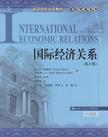国际经济关系
出版时间:2009-8 出版社:中国人民大学出版社 作者:斯佩罗,哈特 著;曹远征 编审;刘春生 校;田广才 等译 页数:436
Tag标签:无
前言
本书是根据普通高等院校应用型特色规划教材编写计划,按照教育部应用型人才培养的教学要求编写的。全书分为中文部分与英文部分,系统地介绍了当今国际经济关系的发展历程、西方经济体制、南北关系中的政治经济问题及冷战后的全球化与国际协调管理等,涵盖了国际间的贸易及资本流动、国际货币体系和跨国公司的发展等多个经济领域的内容,最大程度地反映了本学科发展的前沿动态。吸收了国际政治学与经济学领域的最新研究成果。 本书来源于美国英文原版教材,经编审后增加忠于原文的中文注解部分。相对于其他的国际经济关系教材。该书更具有前沿性和实用性。各章节中的案例和图表部分都具有权威性和新颖性,能够加深学生对本章节内容的理解,同时也能够扩展学生的知识面,激发学习兴趣。 本书适合作为应用型本科或大专院校的经济或国际管理类国际经济与贸易、国际关系等专业的教材,也可作为国际贸易、国际经济关系等相关领域从业人员的参考用书。
内容概要
《国际经济关系(第六版)》涵盖了国际经济学的相关知识,对自冷战后国际经济关系发展状况,各种国际经济体系的具体情况及随着经济全球化出现的新经济问题进行了详细的介绍。本书几乎涵盖了国际经济关系的所有领域,具体包括:国际经济关系的管理和国际协调,国际货币体系的管理,国际贸易和国内政治学,跨国公司和全球管理,发展中国家的资金流量、贸易和发展战略,第三世界的跨国集团,石油与政治,全球化与治理等问题。本书附有详细的图表、案例以帮助读者更完整、深入地理解各章内容。
书籍目录
第一部分 概述 第一章 国际经济关系中从管理到治理的发展过程 布雷顿森林体系 相互依存时代 全球化时代 本章小结第二部 分西方体制 第二章 国际货币体系的治理 布雷顿森林体系 从布雷顿森林体系到相互依存时代的过渡时期 相互依存时代 全球化时代 20世纪90年代的危机管理 21世纪的全球化货币管理 第三章 国际贸易与国内政治 布雷顿森林体系 相互依存时代 全球化时代 本章小结 第四章 跨国公司和全球治理 跨国公司的共性 外国直接投资的趋势以及其他跨国公司行为 对跨国公司行为的解释 跨国公司行为的结果 外国直接投资的国际政体 本章小结 第三部分 南北体系 第五章 对发展中国家的资金流动 布雷顿森林体系与外国援助 相互依存时代的资金流动 全球化 第六章 贸易和发展战略 布雷顿森林体系:脱离贸易秩序 相互依存:增加发展中国家力量的战略 全球化:参与到贸易制度中来 第七章 第三世界的跨国公司 发展中国家跨国公司和外国直接投资的作用 相互依存 全球化 第八章 石油与政策 公司垄断组织 石油输出国组织系统 其他石油输出国组织 石油输出国组织的衰落 全球化时代 21世纪的石油第四部分 冷战结束的含义 第九章 结论:全球化和治理问题 国际经济管理的发展历程 全球化治理面临的挑战 新的治理体系的特征术语表参考文献
章节摘录
An international monetary system must also have means for adjusting imbal-ances in international payments. In national economies, payments imbalancesamong regions are adjusted more or less automatically through movement ofcapital and through fiscal and monetary policies. In international economic re-lations, disequilibria in payments can be settled by financing, by changing do-mestic economic policy to shift trade and investment patterns, by rationingthe supply of foreign exchange through exchange controls, or by allowing thecurrency exchange rate to change. Effective adjustment can be promoted byinternational cooperation, but successful cooperation depends primarily onimplementing domestic policies to achieve international solutions, a politicallydifficult task. In the Bretton Woods system, adjustment was based on a fixed exchangerate system supplemented by financing, exchange controls, exchange ratechanges, and adaptation of national policies. During the periods ofinterdepen-dence and globalization, a mix of adjustment mechanisms existed. Exchangerates among major members of the system floated; that is, they changed fre-quently in response to market conditions as well as to government interven-tion. Complementing these floating exchange rates were fixed rates amonggroups of countries, such as the EU, and fixed rates between two countries, aswas the case with countries who linked their currencies to the dollar or to othermajor currencies. Under floating rates, frequent exchange rate changes drivenby markets were supplemented by intervention by national authorities in cur-rency markets, financing, and changes in national economic policies. The tension between international adjustment needs and domestic politicalrequirements is a central dilemma of international monetary relations. For ex-ample, it is often necessary but politically difficult to implement policies thatreduce governmental budget deficits and inflation in order to stabilize a coun-trys exchange rate or to reduce the deficit in its balance of payments. Suchpolicies generally result in lower growth rates and higher levels of unemploy-ment in the short term but higher rates of growth and employment in the longterm. It is tempting for governments to put offthe domestic economic reformsnecessary to defend a declining currency or to delay adjustments that might re-duce the size of a balance-of-payments deficit because the necessary adjust-ments are likely to be politically unpopular. Finally, a stable international monetary system promotes international ex-change and economic prosperity, whereas instability disrupts internationaltransactions, threatens financial institutions, and damages domestic economies.A loss of confidence in the system can create economic and political disaster.During the Great Depression of the 1930s, for example, competitive ex-change rate devaluations, competing monetary blocs, and the absence of inter-national cooperation contributed greatly to economic breakdown, domesticpolitical instability, and war.
图书封面
图书标签Tags
无
评论、评分、阅读与下载
用户评论 (总计1条)
- 从世界不同的体制介绍世界经济 很详细 非常有帮助
